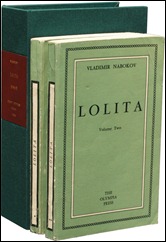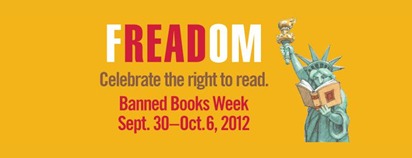Lolita, by Vladimir Nabokov and published in 1955 in Paris and 1958 in New York. Nabokov wrote the novel in English then later translated it himself into Russian. The novel is notable for its controversial subject: the protagonist and unreliable narrator, middle-aged literature professor Humbert Humbert, is obsessed with the 12-year-old Dolores Haze, with whom he becomes sexually involved after he becomes her stepfather. His private nickname for Dolores is Lolita.
 The book is also notable for its writing style. The narrative is highly subjective as Humbert draws on his fragmented memories, employing a sophisticated prose style, while attempting to gain the reader's sympathy through his sincerity and melancholy, although near the end of the story Humbert refers to himself as a "maniac" who "deprived" Dolores "of her childhood", and he shortly thereafter states "the most miserable of family lives was better than the parody of incest" in which they were involved.
The book is also notable for its writing style. The narrative is highly subjective as Humbert draws on his fragmented memories, employing a sophisticated prose style, while attempting to gain the reader's sympathy through his sincerity and melancholy, although near the end of the story Humbert refers to himself as a "maniac" who "deprived" Dolores "of her childhood", and he shortly thereafter states "the most miserable of family lives was better than the parody of incest" in which they were involved.
After its publication, Lolita attained a classic status, becoming one of the best-known and most controversial examples of 20th century literature. The name "Lolita" has entered pop culture to describe a sexually precocious girl.
Because of its subject matter, Nabokov intended to publish it pseudonymously (although the anagrammatic character Vivian Darkbloom would tip off the alert reader).The manuscript was turned down, with more or less regret, by every major publisher in America. After these refusals and warnings, he finally resorted to publication in France by “Olympia Press, three quarters of whose list was pornographic trash, according to critics of the day.
 Although the first printing of 5,000 copies sold out there were no substantial reviews. Eventually, at the very end of 1955, Graham Greene, in the (London) Sunday Times, called it one of the three best books of 1955. This review provoked a response from the (London) Sunday Express, whose editor John Gordon called it "the filthiest book I have ever read" and "sheer unrestrained pornography”. British Customs officers were then instructed by a panicked Home Office to seize all copies entering the United Kingdom. In December of 1956, it was banned in France. Soon after, the ban was repealed, re-instated and finally permanently removed, after the publisher sued the French government. In 1955, British Customs instituted a ban of its own, Argentina followed suit in 1959 and in 1960, New Zealand's government banned the novel under its Customs Act of 1913 calling the work "indecent". The book was again banned in 1974, in South Africa. That ban stayed in effect until 1982. Despite initial trepidation, there was no official response in the U.S., and the first American edition was issued by G.P. Putnam's Sons in August, 1958. The book was into a third printing within days and became the first since Gone with the Wind to sell 100,000 copies in its first three weeks.
Although the first printing of 5,000 copies sold out there were no substantial reviews. Eventually, at the very end of 1955, Graham Greene, in the (London) Sunday Times, called it one of the three best books of 1955. This review provoked a response from the (London) Sunday Express, whose editor John Gordon called it "the filthiest book I have ever read" and "sheer unrestrained pornography”. British Customs officers were then instructed by a panicked Home Office to seize all copies entering the United Kingdom. In December of 1956, it was banned in France. Soon after, the ban was repealed, re-instated and finally permanently removed, after the publisher sued the French government. In 1955, British Customs instituted a ban of its own, Argentina followed suit in 1959 and in 1960, New Zealand's government banned the novel under its Customs Act of 1913 calling the work "indecent". The book was again banned in 1974, in South Africa. That ban stayed in effect until 1982. Despite initial trepidation, there was no official response in the U.S., and the first American edition was issued by G.P. Putnam's Sons in August, 1958. The book was into a third printing within days and became the first since Gone with the Wind to sell 100,000 copies in its first three weeks.
Anyone who has read the novel can tell you it is not an endorsement of pedophilia. It is about irony, dark impulses, tragedy and above all oppression. Humbert takes Lolita's childhood, her chances at friendship, her freedom and even her name (she is Dolores, not Lolita). "Nabokov himself described Humbert as "a vain and cruel wretch" and "a hateful person" (quoted in Levine, 1967)." He is not the "hero" of the story.
In a 1956 letter to his friend Morris Bishop, Vladimir Nabokov addresses the controversy surrounding his book, Lolita. He also gives his take on what is and isn’t pornography by saying, “‘Pornography’ is not an image plucked out of context; pornography is an attitude and an intention. The tragic and the obscene exclude each other.”
The novel continues to generate controversy today as modern society has become increasingly aware of the lasting damage created by child sexual abuse. In 2008, an entire book was published on the best ways to teach the novel in a college classroom given that "its particular mix of narrative strategies, ornate allusive prose, and troublesome subject matter complicates its presentation to students."Today, Lolita is considered by many to be one of the finest novels written in the 20th century. In 1998, it came fourth in a list by the Modern Library of the greatest English-language novels of the 20th century.
“To deny that young girls were throbbing hives of sexual honey was to be both sexist and ageist. On the other hand, to steal samples of that honey or dupe them out of it, or to view them as only hives or even as primarily hives was an equal or perhaps greater wrong.” – Tom Robbins, Fierce Invalids Home From Hot Climates
There’s nothing like making something forbidden that accomplishes more in the way of drawing attention and interest to it,” says author Joyce Maynard about censorship.
To salute Banned Books Week, Open Road authors Natalie Goldberg, Ken Bruen, James Salter, Jonathan Carroll, Alice Walker, Jerome Charyn, David Handler, Jim Kohlberg, Edna O’Brien, John Jakes, and Luis J. Rodríguez share their thoughts about and experiences with censored books.
By reflecting on what it felt like to have their own books banned and celebrating censored favorites such as Lolita, Fahrenheit 451, and Tropic of Cancer, these authors illuminate books that have been hidden in the dark.
"Lo. Lee. Ta." Three Authors Express Love for Vladimir Nabokov’s Lolita
Mary Glickman, author of Home in the Morning and One More River
:
 When we think of the people who ban books, images come to mind of the sexually repressed, of Nazi bonfires, of regressive, extremist sectarians, and other assorted nutcases. We wonder why should we be denied the beauty of a paragraph like: “Lolita, light of my life, fire of my loins. My sin, my soul. Lo-lee-ta: the tip of the tongue taking a trip of three steps down the palate to tap, at three on the teeth. Lo. Lee. Ta.” So what if the novel’s unreliable narrator is a pedophile. It’s not as if Humbert Humbert ends well.
When we think of the people who ban books, images come to mind of the sexually repressed, of Nazi bonfires, of regressive, extremist sectarians, and other assorted nutcases. We wonder why should we be denied the beauty of a paragraph like: “Lolita, light of my life, fire of my loins. My sin, my soul. Lo-lee-ta: the tip of the tongue taking a trip of three steps down the palate to tap, at three on the teeth. Lo. Lee. Ta.” So what if the novel’s unreliable narrator is a pedophile. It’s not as if Humbert Humbert ends well.
Peter Mountford, contributor to Hotel Angeline and author of A Young Man's Guide to Late Capitalism
:
When I was twenty-five and had just abandoned a fledgling career as an international affairs commentator, I moved into a large abandoned Tudor in northwest Washington, DC, and started working as a waiter in a swanky restaurant. The house—my childhood home (my father wasn’t able to sell it)—had one piece of furniture: a mattress, on the floor of the attic. It was romantic stuff: I had no plan, no money, still smoked cigarettes. For entertainment, I owned a typewriter and a library card. Almost by chance, I discovered Nabokov—I was sufficiently oblivious that I’d thought I was in for something like Tolstoy when I picked up Lolita. From that first page—from that deliriously lyrical first sentence, in fact—I fell desperately in love with Nabokov’s writing. I’d never read anything like that before.
For better or worse, I immediately knew what I had to do with the rest of my life: I had to try to re-create that feeling for other people. My first misstep was to try to copy Nabokov’s style (I failed in that particularly dopey way that people who try to imitate Nabokov will do).
Over three months, I read a dozen of Nabokov’s books—underappreciated Ada became my favorite—before I started on the books he admired. He wrote a series of essays on Gogol, so I forced myself to read Gogol. Something similar happened with Don Quixote, but I gave up, because even Nabokov seemed to find Don Quixote unbearable.
Roser Caminals, author of The Street of the Three Beds :
Certain books have been banned based on technicalities. This is the case of Réquiem por un campesino español (Requiem for a Spanish Peasant), a classic novel on the Spanish Civil War by Ramón Sender. The original title was Mosén Millán (Father Millán) and it was the reference to a priest in a political context that resulted in censorship. Once Sender, an exile in Berkeley, California, agreed to change the title, the book was allowed to see the light without further changes. In the case of Lolita, the censor is a reader who doesn’t draw the lines among author, narrator, and character. He thinks that Vladimir Nabokov, a Russian exile in the United States, is a pedophile, and his novel an autobiography that endorses the protagonist’s seduction of a pubescent girl. Irony isn’t written in ink, and so it doesn’t count. When Lolita came out it was derided as a scandal, when in fact it’s a masterpiece that should be a required text in twentieth-century fiction courses. Art can use the vilest materials, such as war, rape, and discarded soda cans, to produce beauty. As Nietszche said, only through aesthetics do we reconcile ourselves to the tragedy of existence. The censor state can’t. It is stuck with the tragedy of ugliness.
The Dirty Lowdown





A must read and a literary classic. Nabokov represents emotions and thoughts with mathematical visual precision. You can feel that each word is weighed against the rest of the sentence, against the rest of the paragraph against the rest of the novel, following the strict tone of the entire piece. Unity is one of the main features of art.
ReplyDeleteEvery page gets laughs.. sometimes its laugh out loud funny. A delight to read..
Wonderfully said, Hindi
ReplyDelete